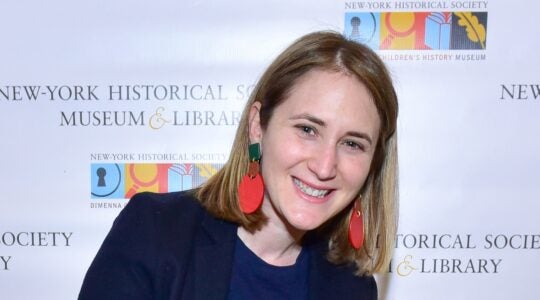Yeshiva and day school administrators who gathered at the Board of Jewish Education on the eve of Yom Kippur voiced their displeasure with a change in funding that will end basic grants to their institutions and instead provide health care coverage and life insurance to additional teachers.
The mood was tense and the discussion spirited as representatives from more than 50 New York-area Jewish schools, spanning the ideological gamut, spoke out against a recent decision by the Fund for Jewish Education to cut about $2.2 million in school grants.
The educators said the change would force cuts in school-based programs and reduce money available for scholarships, and could cause an increase in tuitions.
The yearly grants ranged from $500 to $14,000, with additional money available to schools serving immigrant populations and special-needs students, as well as for community outreach.
Along with the annual grants, the $4.7 million fund had included life insurance and medical benefits for educators.
The fund is a partnership between UJA-Federation of New York and the Caroline and Joseph S. Gruss Life Monument Funds.
Arguing that in effect that the whole of the $2.2 million can be greater than the sum of its parts, the FJE will redistribute the money to provide health care coverage and life insurance to an additional 500 teachers in 30 congregational and day schools, according to Jennifer Rosenberg, planning director of the UJA-Federation’s Commission on Jewish Identity and Renewal.
Additional money will fund a study assessing the needs of special-needs children, a mentoring program pairing new teachers with veteran educators and a school management leadership institute.
“The consensus at the meeting was, ‘please don’t cut our money,’ ” said Richard Altabe, dean of secular studies at Yeshiva Darchei Torah in Far Rockaway, Queens, which received $26,000 from the FJE last year.
The money was earmarked for the school’s special-education and vocational programming, Altabe said.
“In almost all cases, the amount for each school was less than the cost of tuition for one student,” said Billie Gold, FJE committee chair, who spoke and fielded questions at last week’s meeting. “Yet we felt the total was large enough to make a significant impact if used in another way.”
Since 1978, the FJE has spent $123 million funding educator benefits, school grants and other educational programs. Basic grant funding, however, has eroded in recent years as health coverage costs skyrocketed, necessitating more money be devoted to paying for benefits.
Rabbi Joel Cohn, principal of SAR Academy in the Riverdale section of the Bronx, acknowledged that there are no easy answers to how the FJE can best stretch its limited funds.
“It has done a fantastic thing for Jewish education by pumping millions of dollars into the system,” said Cohn, whose school received about $15,000 from the FJE last year. “What they’ve given us, it’s a gift. So on one hand you cannot say anything but thank you. But on the other hand, it’s going to hurt schools, especially those serving immigrant populations.”
At Be’er Hagolah Institute in the Starrett City section of Brooklyn, a majority of the yeshiva’s 850 students are immigrants or the children of immigrants from the former Soviet Union who depend on sizable financial aid subsidies.
Grant money had been used to award scholarships to students who otherwise would have attended public school, and to set up remedial programming for children with little or no background in Hebrew or Judaic studies.
“For us, losing this money is really a disaster,” said Pearl Kaufman, the school’s director. “It means the difference between bringing in more kids on scholarship or not.”
Immigrant grants were established in the 1980s amid the large influx of Jewish emigres from the former Soviet Union.
“All these grants were grandfathered over the years to specific schools, which had been almost alone in serving these populations,” Gold said. “Today, of course, the immigration from the FSU has slowed to a trickle and there are many more schools that either do or would like to serve these populations. We believe our funds could have a greater and longer-term impact by using the money to strengthen these schools, and other schools, in their management and fund-raising capacities.”
The decision to redistribute the funds was neither quick nor flippant, said Rabbi Deborah Joselow, managing director of the Commission on Jewish Identity and Renewal and the federation professional who works with the fund.
Two years ago the FJE convened a focus group to determine the changing needs of Jewish schools. Last year, along with the grant money, school administrators received letters announcing possible “significant changes” in the distribution of funds. The letters, which did not outline specifics, elicited no responses, Rabbi Joselow said.
At the BJE meeting, Kaufman asked if FJE’s decision was reversible.
“I didn’t get a straight ‘no,’ ” she said, “but that was the feeling.”
“It was remarkable that the meeting had the attendance it did since most people walked in knowing it was a fait accompli,” said Rabbi Mordechai Besser, principal of the Manhattan Day School and the chairman of the Yeshiva Elementary Principals Council. “If [the FJE] is going to make such a cataclysmic decision, it may want to have a more collaborative effort.”
Rabbi Besser said that while he would have liked last week’s meeting to have taken place in advance of the FJE decision, Gold and UJA-Federation representatives were quick to acknowledge how they might have better notified educators to the changes.
In the short term, “[Schools] would rather have the cash,” said Gold, adding that in the long run, she is confident day schools and yeshivot will reap the benefits of the FJE’s decision. “We made it clear, I hope, that we look forward to their input as we develop these plans, and if they do not meet expectations, we will certainly consider other options.”
The New York Jewish Week brings you the stories behind the headlines, keeping you connected to Jewish life in New York. Help sustain the reporting you trust by donating today.




